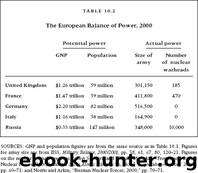The Tragedy of Great Power Politics by Unknown

Author:Unknown
Language: pol
Format: azw3, mobi, epub
Published: 0101-01-01T00:00:00+00:00
Prussia’s first war under Bismarck (1864) was a straightforward case of two great powers, Austria and Prussia, ganging up to attack a minor power, Denmark.43 Their aim was to take the duchies of Schleswig and Holstein away from Denmark. There was widespread sentiment within the German Confederation that those areas should be part of some German political entity, not Denmark, because almost all of Holstein’s and about half of Schleswig’s population spoke German and thus should be considered German nationals.
Austria and Prussia had little difficulty defeating Denmark, but they were unable to agree on who should control Schleswig and Holstein. The United Kingdom, France, and Russia stood aside while Denmark went down to defeat.
Prussia fought Austria in 1866, although Italy, which was a bitter rival of Austria, joined with Prussia in that fight.44 The war was caused in part by the lingering dispute between Austria and Prussia over what to do with Schleswig and Holstein. But the more important issue at stake was which of these great powers would dominate a united Germany. The Prussian army easily defeated
the Austrian army and Prussia gained control of the northern portion of the Third Germany. No other great power intervened to help Austria. Finally, Prussia went to war with France in 1870.45 Bismarck engineered the war on the assumption that a military victory could be used to complete German unification. France fought mainly for territorial compensation to offset Prussia’s gains in 1866. The Prussian army decisively defeated the French army, and Prussia took Alsace and part of Lorraine from France. More important, Prussia gained control of the southern half of the Third Germany, which meant that Bismarck had finally created a united Germany. Europe’s other great powers remained on the sidelines while the French army was routed.
It is not surprising that none of the European great powers balanced against Austria and Prussia in 1864, because the stakes were small. Neither Austria nor Prussia was an especially formidable military power, and it was not clear which one of them, if either, would ultimately control Schleswig and Holstein. But the conflicts of 1866 and 1870 are a different matter. Those wars fundamentally altered the European balance of power in Prussia’s favor. At first glance, one would have expected the United Kingdom, France, and Russia to have balanced with Austria against Prussia in 1866, and Austria, the United Kingdom, and Russia to have done the same with France in 1870. Instead, they all pursued buck-passing strategies, and Austria was left standing alone against Prussia in 1866, while France found itself in the same position in 1870.
The buck-passing that took place in Europe between 1864 and 1870 was motivated by two different rationales. The United Kingdom and Russia actually welcomed Prussia’s victories, because they believed that a unified Germany served their strategic interests.46 Both felt that France was the most threatening great power in Europe, and that a strong Germany on France’s doorstep would help keep it in check. In essence, the United Kingdom and Russia were
Download
The Tragedy of Great Power Politics by Unknown.mobi
The Tragedy of Great Power Politics by Unknown.epub
This site does not store any files on its server. We only index and link to content provided by other sites. Please contact the content providers to delete copyright contents if any and email us, we'll remove relevant links or contents immediately.
Hit Refresh by Satya Nadella(9126)
When Breath Becomes Air by Paul Kalanithi(8427)
The Girl Without a Voice by Casey Watson(7886)
A Court of Wings and Ruin by Sarah J. Maas(7822)
Do No Harm Stories of Life, Death and Brain Surgery by Henry Marsh(6938)
Shoe Dog by Phil Knight(5257)
The Rules Do Not Apply by Ariel Levy(4957)
A Higher Loyalty: Truth, Lies, and Leadership by James Comey(4954)
Hunger by Roxane Gay(4923)
Tuesdays with Morrie by Mitch Albom(4774)
Everything Happens for a Reason by Kate Bowler(4734)
The Immortal Life of Henrietta Lacks by Rebecca Skloot(4581)
Millionaire: The Philanderer, Gambler, and Duelist Who Invented Modern Finance by Janet Gleeson(4469)
How to Change Your Mind by Michael Pollan(4355)
All Creatures Great and Small by James Herriot(4311)
The Money Culture by Michael Lewis(4198)
Man and His Symbols by Carl Gustav Jung(4131)
Elon Musk by Ashlee Vance(4122)
Tokyo Vice: An American Reporter on the Police Beat in Japan by Jake Adelstein(3988)
